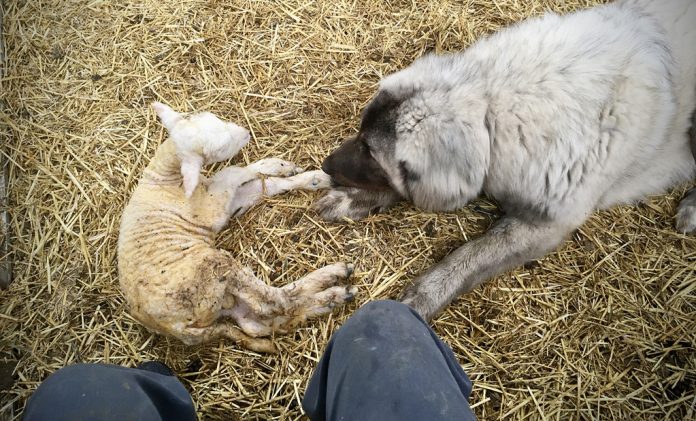
I knelt by the newborn ram lamb, and watched intently. There. A movement of its mouth — slight — and then another. I slapped his sides again, swept more birthing fluid off his face and prayed. There it was again: his mouth clenched, and, then, a breath. His sides rising and falling.
Punica, a 9 month old livestock guardian dog who’s been with us for a month, crouched at my level, just outside the pen, her eyes going from my face to the scene playing out in front of her. No stranger to a few lambing births at her breeder’s, she is getting a taste of lambing during a big round at our farm: via fire hose. In just 24 hours, we’d more than doubled the number of ewes in lambing pens. Mostly twins. A few sets of triplets, too. It’s a flurry of activity that gives little time for deep thought. Just crank it out.
Veteran
This ewe was an old veteran though. She’d had some singles early and stuck around long enough to start consistently throwing twins. She weans them off at even weights. She has a sound temperament, and she’s hardy. She’d needed help with her first lamb; lambs are big this year. Apparently, our ewes came through the winter very well, without extra supplementation.
I helped her, and left her to clean off the lamb and did other chores. I knew she would have another lamb. As I came back toward the barn, I decided to swing through to check on her, before grabbing breakfast. My stomach was snarling; I’d been at it since the early hours of the morning. Oh, and it was a weekday. Time to put on my Farm and Dairy hat.
Rescue
I poked my head in and saw her with the lamb I’d pulled — and another large lamb, stretched out on the ground, not moving, still encased in the birthing sack. I scrambled into the pen. He was warm. I picked him up by the back legs and swung him to clear mucus, and slapped his sides sharply. I repeated those actions a few times. Punica flopped down nearby, watching what was happening, intently.
I put the lamb down. He lay still for several seconds. Then, took his first shaky breaths. Then, more. I kept cleaning his face to make sure the mucus wasn’t settling into his nose and mouth. The ewe sniffed him a few times, but I’m not sure how long he had been lying motionless. Ewes seem to know if a lamb isn’t thriving. She was skeptical.
But he was breathing. I looked up at Punica’s bright eyes and grinned. “I think he’s going to make it!” I mimicked a fist bump in her direction. I’m sure, if she had opposable thumbs, she would have reciprocated. Instead, she bounced up into a sit, ears perked.
The ewe, however, was still skeptical, even as the ram lamb took gasping breaths and uttered his first raspy baa or two. I watched her for a few minutes. She didn’t leap into action. Understandable. I got him out of the pen and set him down just outside, within Punica’s reach. I told her it was OK if she wanted to help clean him. She looked concerned and deferred — an excellent decision for a young dog, actually. Although I would have allowed it in this case, I do not want my dogs interfering with ewe-lamb bonding in any way.
Revived
We tubed him with some milk and brought him into the house. Maybe the ewe would take him back later. Maybe. He spent a couple of hours ensconced in a cardboard box, wrapped in towels. At first, he was quiet. It’s a strange time when you have a lamb that needs extra attention. You hope, but not too much. You never know if it will make a turn for the better or for the worse. You do what you can, and you wait.
My phone rang. It was a source calling via Farm and Dairy. (We’re still working remotely.) I answered, sitting at my kitchen table. In the middle of the call, the lamb revived, thrashing around in his box, baaing. Puck, my 6 month old border collie puppy, whimpered at my feet, attuned to the thrashing and baaing box. I didn’t even pause in the conversation.
Restored
The call ended. I checked the lamb, and he was raring to go. I whisked him back outside and set him in the pen with his mama and his brother. She sniffed him. Sniffed again. And, then, gave a maternal grunt and started licking him off. I blessed her and her future generations profusely.
It doesn’t always end this way. I’ve said it before and I’ll say it again: in farming, you have the good, and you have the bad. As long as the good outweighs the bad, you’re doing fine. I’ve been on the bad end of things often enough. It happens.
That ewe and her lambs are doing well. In the midst of the chaos of lambing, I’ll take a win like that any day. We’re almost halfway through. We’re going to have around 400 lambs. There’s not much we haven’t seen at this point, but who knows. It’s not over yet.











